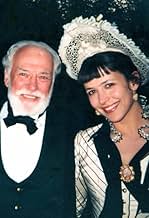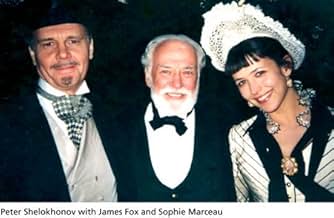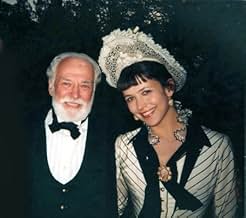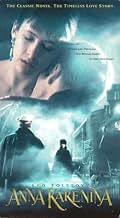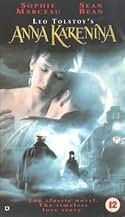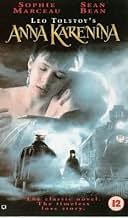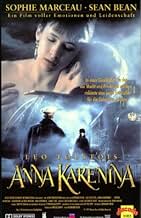VALUTAZIONE IMDb
6,3/10
6340
LA TUA VALUTAZIONE
Anna (Marceau) è una moglie e una madre che ha una relazione con il bel conte Vronskij. Basato sul romanzo di Tolstoj.Anna (Marceau) è una moglie e una madre che ha una relazione con il bel conte Vronskij. Basato sul romanzo di Tolstoj.Anna (Marceau) è una moglie e una madre che ha una relazione con il bel conte Vronskij. Basato sul romanzo di Tolstoj.
Petr Shelokhonov
- Kapitonich, Chief Butler
- (as Pyotr Sholokhov)
Recensioni in evidenza
I saw this movie almost accidentally and I LOVED it! It made me a fan of Sophie Marceau, a beautiful and talented French actress. To my delight Sophie is starring in some upcoming movies (which I will not miss). I would recommend this movie to anyone looking for a movie with all the components that makes a classic. Too bad it didn't hit the mainstream, it was very under-rated. Bottom line: I loved this movie, and I am usually quite picky about which movies I say that about!
This was surprisingly good. I'm not that much a fan of the Romance genre, if truth be told, but I'll make an exception for this one. The film is carefully crafted. Every emotion, every dialogue enhanced the overall tone of the film, slowly but surely escalating in its momentum up to its tragic climax.
Sophie Marceau was brilliant. As was Sean Bean. I wasn't quite sure if they would be able to possess the kind of chemistry needed to pull this off, if truth be told, considering how they (in my opinion) seem to be of different temperament artistically (Sophie being more sensitive as seen in Braveheart and Marquis, while Bean is more explosive). Nevertheless, it worked out fine although, ironically, their relationship seem to be more believable whenever they fell out of odds with each other. :)
Sophie Marceau was brilliant. As was Sean Bean. I wasn't quite sure if they would be able to possess the kind of chemistry needed to pull this off, if truth be told, considering how they (in my opinion) seem to be of different temperament artistically (Sophie being more sensitive as seen in Braveheart and Marquis, while Bean is more explosive). Nevertheless, it worked out fine although, ironically, their relationship seem to be more believable whenever they fell out of odds with each other. :)
Of all the versions of the Tolstoy novel which I have seen (two with Greta Garbo, the deplorable one with Vivien Leigh, another with Jacqueline Bisset), this is the one that really reflects the scope and social observation of the book. The careful direction and art direction, the St.Petersburg backgrounds, as well as the exquisite cinematography, make this movie a real feast for the eyes, with magnificent plastic compositions and lighting in every shot. The abused Tchaikovsky music was used discreetly. Sophie Marceau plays a very young Anna, and makes her credible all the time. Sean Bean and James Fox, as Vronsky and Karenin, are admirable. And even if the screen play by director Bernard Rose is a little too literary, the complete story was told, and the result was the best Anna Karenina the screen has offered.
Now, perhaps I'm out of my element writing a review for "Anna Karenina" without having read the book, but I shall do so regardless. Many criticised this film because it did not follow the book, or omitted one thing or another. That is all well and good, but what feature-length film *can* capture the entire scope of a novel the size of "Anna Karenina"? I watched the older version with Greta Garbo and--though I cannot imagine why--it never truly caught my attention. This version, however, captured me from the start. And I am usually the first one to complain about what is wrong with a remake in comparison to the old version. A paradox, indeed.
This film first caught my eye because of Sophie Marceau. I admire her immensely as an actress, having seen her in several films, both French and English. Then, I recognised Bernard Rose as the director of "Immortal Beloved", a film I had enjoyed some months before, mostly due to a magnificent performance by Gary Oldman, some of the most glorious music caught on film.
The music, I can probably cite as one of the main reasons I loved this film. I can think of no better love theme for a doomed romance like that of Anna and Vronsky, than the first movement of Tchaikovsky's Sixth Symphony. The use of "Swan Lake" at various points was also wonderful, and the interplay during the scene at the ballet held me mesmerised. Vronsky speaks of Anna being trapped in her marriage as the Prince seeks to capture the Swan Queen. Perhaps I'm just rambling, but somehow that connected.
On the whole, the performances were good. Sophie Marceau was perfectly believable as Anna, and some of her scenes sent chills down my spine, though my favourite performance of hers still has to be "Firelight". Sean Bean had me worried for a few seconds, with a mannered reading or two, but improved quickly as the film progressed. Another reviewer pointed out that Vronsky was meant to be a shallower character than Anna, and now that I think back on it, I believe that is very true, and that Sean Bean's performance reflected this superficiality. Mia Kirshner was adequate--I didn't particularly care for her--but Alfred Molina and James Fox both gave fine performances (a standout for me was when Anna wrote Karenin from Italy and Karenin wavered before refusing to let her see Sergei).
However, equally on par with the actors, was the setting. Very few films, I have to admit, can look *so* beautiful. Especially the ballroom scene, with the seemingly neverending hallway of gilded doors, the location photography was spectacular. The costumes were stunning, and the cinematography made even snow seem alive. Even if you do not care for the story or the acting, this is a film to watch for visuals.
Thus, I believe that this film deserves far more credit than it received. I, personally, loved it for varied reasons, but I have to admit that what truly captured me was the way Bernard Rose can take an average script and transform it into a beautiful film using visuals and music. Very few directors take the time to put music and image together if they use classical scores (my favourites would be David Lean and John Boorman), and I believe Bernard Rose should be watched in the future. I should love to see what he would do with a film set in late 19th century Italy, when opera was at its height!
***1/2 out of ****
This film first caught my eye because of Sophie Marceau. I admire her immensely as an actress, having seen her in several films, both French and English. Then, I recognised Bernard Rose as the director of "Immortal Beloved", a film I had enjoyed some months before, mostly due to a magnificent performance by Gary Oldman, some of the most glorious music caught on film.
The music, I can probably cite as one of the main reasons I loved this film. I can think of no better love theme for a doomed romance like that of Anna and Vronsky, than the first movement of Tchaikovsky's Sixth Symphony. The use of "Swan Lake" at various points was also wonderful, and the interplay during the scene at the ballet held me mesmerised. Vronsky speaks of Anna being trapped in her marriage as the Prince seeks to capture the Swan Queen. Perhaps I'm just rambling, but somehow that connected.
On the whole, the performances were good. Sophie Marceau was perfectly believable as Anna, and some of her scenes sent chills down my spine, though my favourite performance of hers still has to be "Firelight". Sean Bean had me worried for a few seconds, with a mannered reading or two, but improved quickly as the film progressed. Another reviewer pointed out that Vronsky was meant to be a shallower character than Anna, and now that I think back on it, I believe that is very true, and that Sean Bean's performance reflected this superficiality. Mia Kirshner was adequate--I didn't particularly care for her--but Alfred Molina and James Fox both gave fine performances (a standout for me was when Anna wrote Karenin from Italy and Karenin wavered before refusing to let her see Sergei).
However, equally on par with the actors, was the setting. Very few films, I have to admit, can look *so* beautiful. Especially the ballroom scene, with the seemingly neverending hallway of gilded doors, the location photography was spectacular. The costumes were stunning, and the cinematography made even snow seem alive. Even if you do not care for the story or the acting, this is a film to watch for visuals.
Thus, I believe that this film deserves far more credit than it received. I, personally, loved it for varied reasons, but I have to admit that what truly captured me was the way Bernard Rose can take an average script and transform it into a beautiful film using visuals and music. Very few directors take the time to put music and image together if they use classical scores (my favourites would be David Lean and John Boorman), and I believe Bernard Rose should be watched in the future. I should love to see what he would do with a film set in late 19th century Italy, when opera was at its height!
***1/2 out of ****
Along with War and Peace, Anna Karenina is one of the greatest Russian novels and one of the greats of 19th century literature, the story is heart-breaking and intense and the characters compelling. Anna Karenina has often been filmed, and of the film versions the 1967 Russian and 1935 Greta Garbo films fare the best and the 2012 Joe Wright-directed version the weakest. This 1997 adaptation from Bernard Rose (Paperhouse, Immortal Beloved, Candyman) has a good amount to like but is one of the weaker adaptations.
Visually, the film looks absolutely stunning and along with the 1967 Russian film it is one of the most evocative adaptations period detail-wise. Although some of the editing is choppy, the cinematography is ravishing and the costumes and sets are some of the most beautiful and evocative of any adaptation of Anna Karenina, especially in the opulent ballroom scene and the gorgeous wintry landscapes. The Tchaikovsky-laden music score makes for an aural feast and couldn't have fitted more perfectly.
Three performances are good. Coming off best is Alfred Molina, who brings authority and many layers to Levin, wish more was done with developing the character more in terms of writing but at least the film included the character and his subplot with Kitty. James Fox is a ruthlessly cold and haunting Karenin, the character played consistently well in all the Anna Karenina adaptations even in the not-so-good ones. Sean Bean is a handsome Vronsky, but brings a steely intensity to the role that stops the character from being wooden or tragic, rightfully avoiding the dashing heroic figure stereotype.
Sophie Marceau however I found miscast as Anna, she looks splendid but is pretty vacuous and lacking in passion. Her chemistry with Bean convinces in the latter and more turbulent parts of the relationship but dull in the early parts. Mia Kirschner is also rather too modern and lightweight for Kitty. This version of Anna Karenina is a visual and aural stunner with a few impressive performances, but is one of the least successful and interesting versions in terms of script and how the story is told.
The dialogue doesn't always flow naturally, and feels very dry in tone and with little depth and substance, and the narration was rather unnecessary. Rose's direction shows terrific technical assurance but lacks the same kind of momentum in telling the story. It's the story where the film most falls down, feeling far too short and far too rushed, with about half of the story (or so it feels) being told but all in Cliff Notes version, and it even feels like more of the film was filmed but cut due to studio interference. Neither of the romances are dealt with well, Anna and Vronsky's is too rushed and the very incomplete-feeling one between Levin and Kitty sometimes really slows down the film.
Overall, not a bad version but a less than ideal one, as an adaptation and as a film on its own. 5/10 Bethany Cox
Visually, the film looks absolutely stunning and along with the 1967 Russian film it is one of the most evocative adaptations period detail-wise. Although some of the editing is choppy, the cinematography is ravishing and the costumes and sets are some of the most beautiful and evocative of any adaptation of Anna Karenina, especially in the opulent ballroom scene and the gorgeous wintry landscapes. The Tchaikovsky-laden music score makes for an aural feast and couldn't have fitted more perfectly.
Three performances are good. Coming off best is Alfred Molina, who brings authority and many layers to Levin, wish more was done with developing the character more in terms of writing but at least the film included the character and his subplot with Kitty. James Fox is a ruthlessly cold and haunting Karenin, the character played consistently well in all the Anna Karenina adaptations even in the not-so-good ones. Sean Bean is a handsome Vronsky, but brings a steely intensity to the role that stops the character from being wooden or tragic, rightfully avoiding the dashing heroic figure stereotype.
Sophie Marceau however I found miscast as Anna, she looks splendid but is pretty vacuous and lacking in passion. Her chemistry with Bean convinces in the latter and more turbulent parts of the relationship but dull in the early parts. Mia Kirschner is also rather too modern and lightweight for Kitty. This version of Anna Karenina is a visual and aural stunner with a few impressive performances, but is one of the least successful and interesting versions in terms of script and how the story is told.
The dialogue doesn't always flow naturally, and feels very dry in tone and with little depth and substance, and the narration was rather unnecessary. Rose's direction shows terrific technical assurance but lacks the same kind of momentum in telling the story. It's the story where the film most falls down, feeling far too short and far too rushed, with about half of the story (or so it feels) being told but all in Cliff Notes version, and it even feels like more of the film was filmed but cut due to studio interference. Neither of the romances are dealt with well, Anna and Vronsky's is too rushed and the very incomplete-feeling one between Levin and Kitty sometimes really slows down the film.
Overall, not a bad version but a less than ideal one, as an adaptation and as a film on its own. 5/10 Bethany Cox
Lo sapevi?
- QuizThis was the first western production of "Anna Karenina" to be filmed in Russia (St. Petersburg).
- BlooperDuring the movie, title cards inform the viewer that the story arch unfolds in the years 1880 to 1882 - yet at the end of the movie Vronsky leaves to fight in the Russo-Turkish war of 1877- 1878.
- Citazioni
Anna Karenina: What are you doing here?
Vronsky: You know that I have come to be where you are. I cannot help myself.
- ConnessioniReferenced in 13 posterunek: Kalambury filmowe (1998)
- Colonne sonoreSymphony No. 6 in B Minor, op. 74 (Pathetique)
Written by Pyotr Ilyich Tchaikovsky (as Peter Ilyich Tchaikovsky)
Performed by The St. Petersburg Philharmonic Orchestra
Conducted by Georg Solti (as Sir Georg Solti)
Courtesy of Icon Records and London Records
I più visti
Accedi per valutare e creare un elenco di titoli salvati per ottenere consigli personalizzati
- How long is Anna Karenina?Powered by Alexa
Dettagli
- Data di uscita
- Paesi di origine
- Siti ufficiali
- Lingue
- Celebre anche come
- Leo Tolstoy's Anna Karenina
- Luoghi delle riprese
- Aziende produttrici
- Vedi altri crediti dell’azienda su IMDbPro
Botteghino
- Budget
- 35.000.000 USD (previsto)
- Lordo Stati Uniti e Canada
- 858.553 USD
- Fine settimana di apertura Stati Uniti e Canada
- 75.268 USD
- 6 apr 1997
- Lordo in tutto il mondo
- 858.553 USD
- Tempo di esecuzione1 ora 48 minuti
- Colore
- Mix di suoni
- Proporzioni
- 2.35 : 1
Contribuisci a questa pagina
Suggerisci una modifica o aggiungi i contenuti mancanti

Divario superiore
By what name was Anna Karenina (1997) officially released in India in English?
Rispondi

